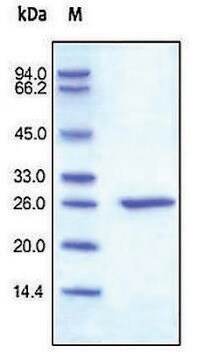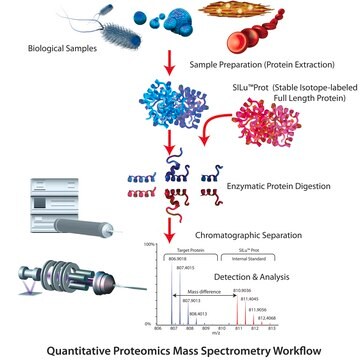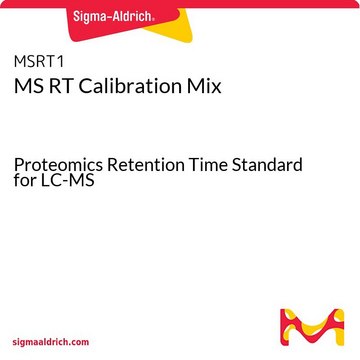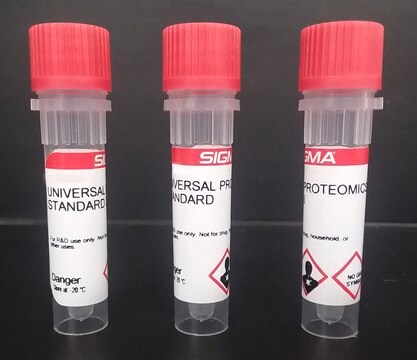Wszystkie zdjęcia(1)
Kluczowe dokumenty
MSST0022
SILu™Lite CRP C-reactive Protein human
recombinant, expressed in HEK 293 cells, MS Protein Standard
Synonim(y):
PTX1, pentaxin, pentraxin
Zaloguj sięWyświetlanie cen organizacyjnych i kontraktowych
About This Item
Kod UNSPSC:
23201100
NACRES:
NA.12
Polecane produkty
pochodzenie biologiczne
human
Poziom jakości
rekombinowane
expressed in HEK 293 cells
Próba
≥98% (SDS-PAGE)
Formularz
liquid
metody
mass spectrometry (MS): suitable
przydatność
suitable for mass spectrometry (internal calibrator)
numer dostępu UniProt
temp. przechowywania
−20°C
informacje o genach
human ... PTX3(5806)
Opis ogólny
SILu™Lite CRP is a recombinant human protein expressed in human 293 cells. It is a protein consisting of 226 amino acids (including a C-terminal polyhistidine and FLAG® tags), with a calculated molecular weight of ~25 kDa. SILu™Lite CRP is an analytical standard designed to be used as starting material for preparation of calibrators and controls in LC-MS applications.
Suggested Quantitative Analysis Parameters
(MRM settings provided for three suggested peptides)
Suggested Quantitative Analysis Parameters
(MRM settings provided for three suggested peptides)
Działania biochem./fizjol.
CRP is a hepatically derived pentraxin. It exists mainly as a pentamer in a cyclic structure with 5 identical 23-kD subunits in the blood. In addition to its role as an "acute phase" protein or first-line defense molecule against pathogenic organisms, baseline levels of CRP correlate positively to adverse cardiovascular events. CRP is therefore being considered a “risk factor” for cardiovascular disease. In humans, treatment with statin therapy reduces levels of both LDL-C and CRP, and concurrently there is a reduction in the number of cardiovascular events. A recent study suggests that patients with elevated basal levels of CRP are at an increased risk of diabetes, in addition to cardiovascular disease. A study of over 700 nurses showed that those in the highest quartile of trans fat consumption had blood levels of CRP that were 73% higher than those in the lowest quartile.
Sekwencja
QTDMSRKAFVFPKESDTSYVSLKAPLTKPLKAFTVCLHFYTELSSTRGYSIFSYATKRQDNEILIFWSKDIGYSFTVGGSEILFEVPEVTVAPVHICTSWESASGIVEFWVDGKPRVRKSLKKGYTVGAEASIILGQEQDSFGGNFEGSQSLVGDIGNVNMWDFVLSPDEINTIYLGGPFSPNVLNWRALKYEVQGEVFTKPQLWPDYKDDDDKGHHHHHHHHGGQ
Postać fizyczna
Supplied as a solution of phosphate buffered saline with 25% glycerol.
Informacje prawne
FLAG is a registered trademark of Merck KGaA, Darmstadt, Germany
SILu is a trademark of Sigma-Aldrich Co. LLC
Ta strona może zawierać tekst przetłumaczony maszynowo.
Kod klasy składowania
10 - Combustible liquids
Klasa zagrożenia wodnego (WGK)
WGK 1
Temperatura zapłonu (°F)
Not applicable
Temperatura zapłonu (°C)
Not applicable
Wybierz jedną z najnowszych wersji:
Certyfikaty analizy (CoA)
Lot/Batch Number
Nie widzisz odpowiedniej wersji?
Jeśli potrzebujesz konkretnej wersji, możesz wyszukać konkretny certyfikat według numeru partii lub serii.
Masz już ten produkt?
Dokumenty związane z niedawno zakupionymi produktami zostały zamieszczone w Bibliotece dokumentów.
Steven E Nissen et al.
The New England journal of medicine, 352(1), 29-38 (2005-01-07)
Recent trials have demonstrated better outcomes with intensive than with moderate statin treatment. Intensive treatment produced greater reductions in both low-density lipoprotein (LDL) cholesterol and C-reactive protein (CRP), suggesting a relationship between these two biomarkers and disease progression. We performed
R P Tracy et al.
Arteriosclerosis, thrombosis, and vascular biology, 17(10), 2167-2176 (1997-11-14)
Blood levels of C-reactive protein (CRP), a marker of inflammation, are related to cardiovascular disease risk. To determine cross-sectional correlates in the elderly, we measured CRP in 400 men and women older than 65 years and free of clinical cardiovascular
Esther Lopez-Garcia et al.
The Journal of nutrition, 135(3), 562-566 (2005-03-01)
Trans fatty acid intake has been associated with a higher risk of cardiovascular disease. The relation is explained only partially by the adverse effect of these fatty acids on the lipid profile. We examined whether trans fatty acid intake could
A D Pradhan et al.
JAMA, 286(3), 327-334 (2001-07-24)
Inflammation is hypothesized to play a role in development of type 2 diabetes mellitus (DM); however, clinical data addressing this issue are limited. To determine whether elevated levels of the inflammatory markers interleukin 6 (IL-6) and C-reactive protein (CRP) are
Nasz zespół naukowców ma doświadczenie we wszystkich obszarach badań, w tym w naukach przyrodniczych, materiałoznawstwie, syntezie chemicznej, chromatografii, analityce i wielu innych dziedzinach.
Skontaktuj się z zespołem ds. pomocy technicznej







